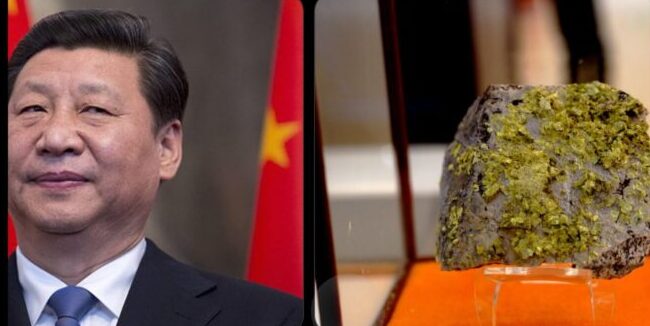China discovers large uranium ore deposit, which will significantly increase the country’s uranium reserves
In a groundbreaking development, China has announced the discovery of a large uranium ore deposit, set to significantly increase the country’s uranium reserves. This discovery is poised to have major implications for China’s nuclear energy ambitions, as well as broader geopolitical and economic considerations surrounding the global energy market. As the world’s largest consumer of energy, China is strategically positioning itself to meet its growing energy demands while simultaneously reducing its reliance on fossil fuels and reducing its carbon emissions.
With nuclear energy being a crucial component of China’s long-term energy strategy, this new uranium deposit could serve as a key part of the country’s plan to expand its nuclear energy capacity. However, this discovery also has wider implications for the global uranium market, international energy security, and the dynamics of the nuclear energy race among major powers.
A Significant Boost to China’s Uranium Reserves
The newly discovered uranium ore deposit in China is estimated to be one of the largest of its kind in recent years. This discovery is expected to provide a substantial increase in the country’s uranium reserves, ensuring a more secure and long-term supply of the key material needed for nuclear power generation.
Uranium is the primary fuel for nuclear reactors, and its availability is critical to the expansion of nuclear energy programs worldwide. For China, this discovery comes at an opportune moment, as the country is striving to boost its nuclear energy production in line with its ambitious climate goals.
China’s uranium reserves have historically been limited compared to those of other nuclear powers like Kazakhstan, Canada, and Australia. The discovery of this new deposit is a game changer, providing China with the potential to become less dependent on imported uranium and allowing it to meet its nuclear energy needs from domestic sources. This aligns with China’s broader goals of energy security, economic self-sufficiency, and reducing dependence on foreign resources.
China’s Nuclear Energy Strategy: Key to Future Growth
China’s nuclear energy strategy has been a central element of its plan to transition away from coal and reduce its carbon emissions. As the world’s largest emitter of greenhouse gases, China has made significant investments in renewable energy sources like wind and solar, while also prioritizing the expansion of nuclear power. Nuclear energy is viewed as a clean and reliable source of electricity, which can help China meet its growing energy demand while reducing its environmental impact.
China has set ambitious targets for expanding its nuclear power capacity over the next several decades. The country currently operates more than 50 nuclear reactors, with plans to build dozens more in the coming years. This new uranium discovery will be instrumental in supporting this growth.
In particular, the discovery helps China secure a critical supply of uranium, which is essential for fueling its nuclear reactors. While the country has previously relied on imports for much of its uranium supply, this newfound domestic source could reduce its vulnerability to fluctuations in the global uranium market, which is often subject to geopolitical risks, market volatility, and supply chain disruptions.
Implications for the Global Uranium Market
China’s increased uranium reserves are likely to have significant effects on the global uranium market. As one of the largest consumers of uranium for its nuclear reactors, any major shift in China’s domestic supply will impact the supply-demand dynamics within the global market.
First, the discovery of this large deposit could reduce China’s reliance on uranium imports, which could affect global uranium prices. Countries like Kazakhstan, Canada, and Australia, which are major exporters of uranium, may see shifts in demand from China. While these nations have diversified their customer bases, China remains one of the largest importers of uranium, and any decrease in its demand could influence pricing and trade flows.
Additionally, China’s uranium reserves and its growing role as a major nuclear power could lead to greater competition for uranium resources on the international market. As global demand for nuclear energy rises—driven by countries seeking to reduce their carbon footprints and secure reliable energy supplies—uranium will become an increasingly valuable commodity. The geopolitical and economic ramifications of this could be significant, particularly for countries with large uranium deposits and the ability to supply global markets.
Geopolitical and Strategic Implications
The discovery of a significant uranium deposit in China also has important geopolitical and strategic implications, particularly in the context of the global race for energy resources. As countries around the world seek to bolster their nuclear energy capabilities, access to uranium has become a key point of competition.
China’s strengthened position in the uranium market could alter its relationships with other nuclear powers. As one of the world’s largest consumers of uranium, China’s actions in securing domestic supplies could shift global supply chains, prompting other countries to adjust their strategies for uranium production and trade. Countries that are heavily reliant on uranium exports to China, such as Kazakhstan and Canada, may need to recalibrate their long-term energy policies to account for the shift in demand.
Moreover, the growing importance of uranium in global energy security may drive China to seek further international agreements and partnerships to secure long-term access to uranium and other energy resources. This could involve new agreements with countries that possess large uranium reserves or the development of joint ventures in uranium mining projects.
The strategic value of uranium is further amplified by the global race for nuclear energy, which is increasingly being seen as a key solution to addressing climate change and ensuring energy security. As other countries, including India, Russia, and the European Union, expand their nuclear energy capabilities, uranium could become a focal point in the competition for energy resources, as well as in broader geopolitical maneuvering.
Environmental and Economic Considerations
While the discovery of new uranium deposits in China represents a significant boost to the country’s energy strategy, there are also environmental and economic factors to consider. Mining uranium is an energy-intensive process that can have significant environmental impacts, including the risk of radiation exposure and pollution. As China seeks to expand its uranium mining operations, it will need to implement strict environmental standards to mitigate the potential ecological damage caused by mining activities.
Economically, the discovery could create new opportunities for growth in China’s mining and energy sectors. By tapping into its domestic uranium reserves, China could reduce its reliance on uranium imports, saving considerable amounts of money that would otherwise go toward purchasing foreign uranium. Moreover, the development of new uranium mining operations could create jobs and stimulate economic growth in the regions where these deposits are located.
However, China will also need to balance the economic benefits of increased domestic uranium supply with the need for sustainable development practices. As the country moves forward with its nuclear energy goals, ensuring the responsible management of both its natural resources and its environmental footprint will be key to maintaining public support and ensuring long-term success.
Conclusion: A New Chapter for China’s Energy Future
China’s discovery of a large uranium ore deposit marks a pivotal moment in the country’s energy strategy. With nuclear energy playing an increasingly important role in China’s transition to cleaner energy sources, this discovery will help secure the country’s future energy needs while supporting its climate goals. It also positions China as an even more influential player in the global energy market, particularly in the nuclear sector.
As China’s domestic uranium reserves grow, it will have more flexibility to meet its nuclear energy ambitions without relying as heavily on imports. The implications of this discovery extend far beyond China’s borders, with the global uranium market likely to experience shifts in demand and pricing. Furthermore, China’s growing influence in the uranium market could lead to new geopolitical dynamics as countries compete for access to this vital resource.
As China continues to prioritize energy security, sustainability, and climate action, its newfound uranium reserves will be an integral part of its strategy to build a more resilient, low-carbon energy future. How the country navigates the development of its domestic uranium supply, while balancing economic growth and environmental concerns, will be crucial in shaping the global energy landscape in the years to come.

















Post Comment